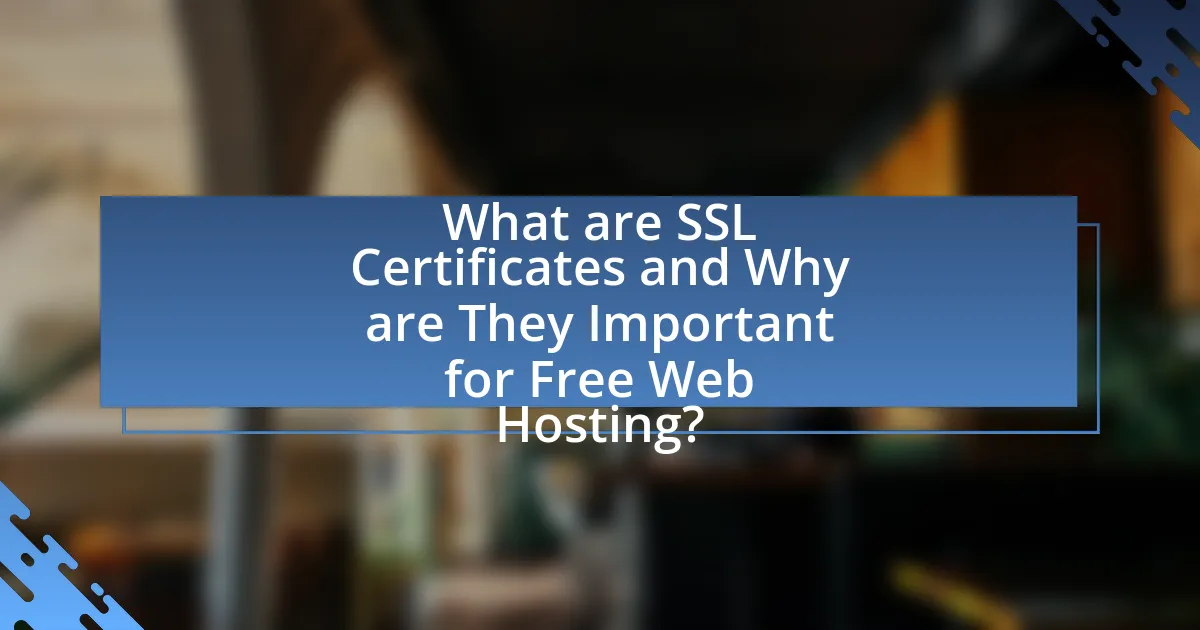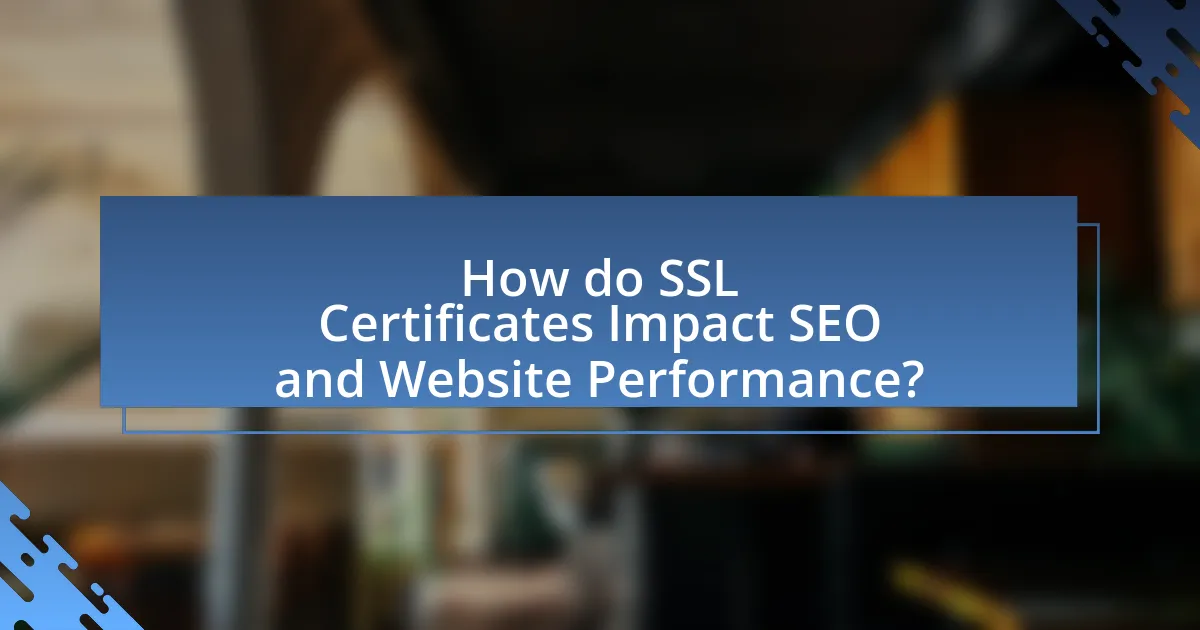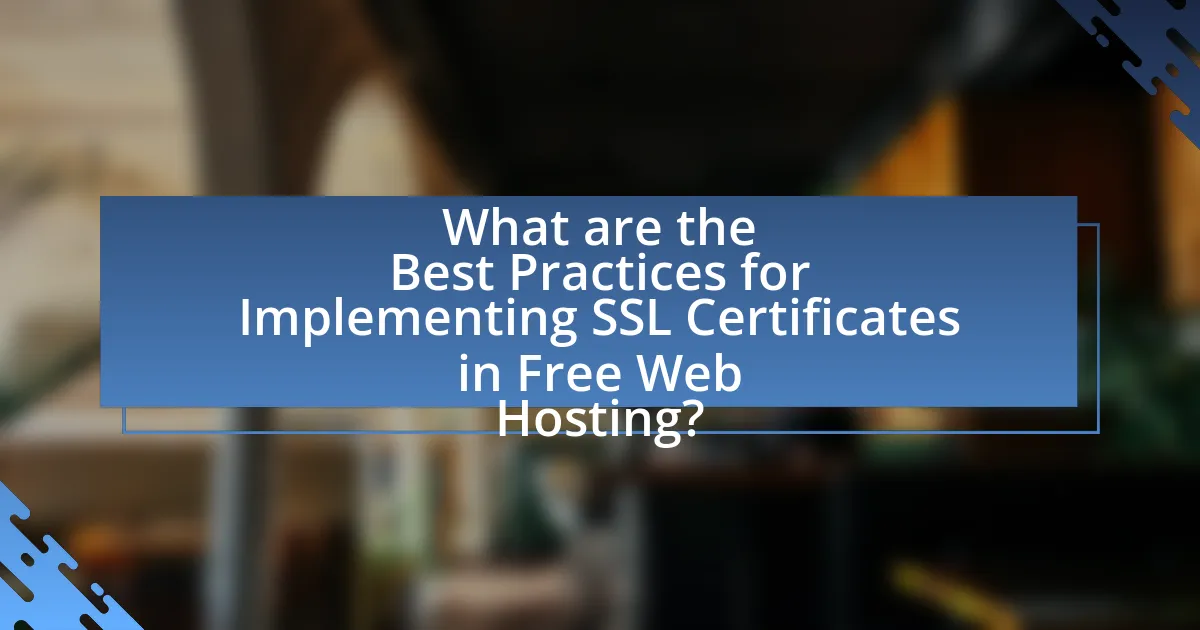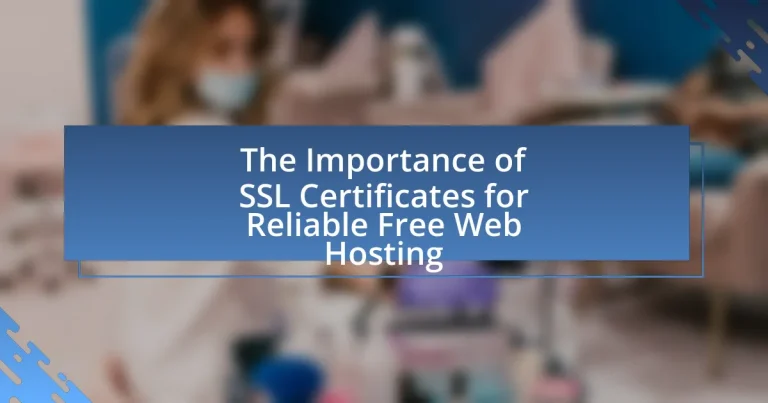SSL certificates are essential digital tools that authenticate website identities and encrypt data exchanged between users and servers, significantly enhancing security, especially in free web hosting environments. This article explores the critical role of SSL certificates in protecting sensitive information, improving search engine rankings, and fostering user trust. It details how SSL certificates work, the types of data they protect, and their impact on website performance and analytics. Additionally, the article addresses best practices for implementing SSL certificates, common misconceptions, and the implications of lacking SSL for both security and user engagement.

What are SSL Certificates and Why are They Important for Free Web Hosting?
SSL certificates are digital certificates that authenticate the identity of a website and encrypt information sent between the server and the user. They are crucial for free web hosting because they enhance security by protecting sensitive data, such as personal information and payment details, from interception by malicious actors. Additionally, SSL certificates improve search engine rankings and build user trust, as browsers display warnings for sites without them. According to a 2021 study by Google, over 80% of users abandon websites that do not have SSL certificates, highlighting their importance in maintaining user engagement and credibility in the online space.
How do SSL Certificates enhance website security?
SSL certificates enhance website security by encrypting data transmitted between the user’s browser and the web server. This encryption prevents unauthorized access to sensitive information, such as personal details and payment information, during transmission. According to a study by Google, HTTPS, which is enabled by SSL certificates, protects against man-in-the-middle attacks and eavesdropping, significantly reducing the risk of data breaches. Furthermore, SSL certificates also authenticate the identity of the website, ensuring users are communicating with the legitimate site and not an imposter, which builds trust and confidence in online transactions.
What types of data do SSL Certificates protect?
SSL Certificates protect sensitive data transmitted over the internet, including personal information, credit card details, login credentials, and any other confidential data exchanged between a user and a website. This protection is achieved through encryption, which secures the data from interception by unauthorized parties during transmission. The use of SSL Certificates is essential for maintaining user trust and ensuring data integrity, as they prevent data breaches and cyberattacks that can compromise sensitive information.
How does encryption work in SSL Certificates?
Encryption in SSL Certificates works by establishing a secure connection between a web server and a client through a process called the SSL handshake. During this handshake, the server presents its SSL Certificate to the client, which contains the server’s public key. The client verifies the certificate’s authenticity using a trusted Certificate Authority (CA). Once verified, the client generates a unique session key, encrypts it with the server’s public key, and sends it to the server. The server then decrypts the session key using its private key. This session key is used for symmetric encryption of the data exchanged during the session, ensuring confidentiality and integrity. The use of public and private keys in this process is a fundamental aspect of asymmetric encryption, which underpins the security of SSL Certificates.
What role do SSL Certificates play in user trust?
SSL certificates play a crucial role in establishing user trust by encrypting data exchanged between users and websites, ensuring that sensitive information remains secure. This encryption protects against eavesdropping and man-in-the-middle attacks, which can compromise user data. According to a 2021 study by Google, 85% of users are more likely to trust a website that uses HTTPS, which is enabled by SSL certificates. Furthermore, browsers often display visual indicators, such as a padlock icon, to signify a secure connection, reinforcing user confidence in the site’s legitimacy.
How do SSL Certificates affect user perception of a website?
SSL certificates significantly enhance user perception of a website by establishing trust and security. When users see a website with an SSL certificate, indicated by “https://” in the URL and a padlock icon, they are more likely to feel that their data is protected from potential threats. Research by GlobalSign indicates that 84% of consumers abandon a purchase if they feel the website is not secure, highlighting the critical role SSL certificates play in user confidence. Furthermore, websites with SSL certificates are perceived as more professional and credible, which can lead to increased user engagement and conversion rates.
What are the consequences of lacking an SSL Certificate?
Lacking an SSL certificate can lead to significant security vulnerabilities and loss of user trust. Without SSL, data transmitted between a user’s browser and the website is not encrypted, making it susceptible to interception by malicious actors. This lack of encryption can result in data breaches, where sensitive information such as passwords and credit card details can be stolen.
Additionally, websites without SSL certificates are often flagged by browsers as “Not Secure,” which can deter users from engaging with the site. According to a 2020 survey by the Online Trust Alliance, 85% of users are less likely to trust a website that does not have an SSL certificate. This loss of trust can lead to decreased traffic, lower conversion rates, and ultimately, financial losses for businesses relying on their online presence.

How do SSL Certificates Impact SEO and Website Performance?
SSL certificates positively impact SEO and website performance by enhancing security and trustworthiness, which are critical ranking factors for search engines. Websites with SSL certificates are prioritized by Google, as indicated by their algorithm updates that favor secure sites, leading to improved search rankings. Additionally, SSL certificates encrypt data, which can reduce the risk of data breaches and enhance user experience, resulting in lower bounce rates and higher engagement metrics. According to a study by Moz, secure sites tend to have better user retention and conversion rates, further supporting the correlation between SSL implementation and overall website performance.
Why are SSL Certificates considered a ranking factor by search engines?
SSL certificates are considered a ranking factor by search engines because they enhance website security, which is a critical aspect of user experience. Search engines like Google prioritize secure websites to protect users from data breaches and cyber threats. In 2014, Google officially announced that HTTPS would be a ranking signal, indicating that sites with SSL certificates could achieve better rankings in search results compared to their non-secure counterparts. This shift reflects the growing emphasis on security and trustworthiness in the digital landscape, influencing both user behavior and search engine algorithms.
How does HTTPS influence search engine results?
HTTPS positively influences search engine results by serving as a ranking signal for search engines like Google. Websites that implement HTTPS are prioritized in search rankings over those that do not, as Google announced in 2014 that HTTPS is a ranking factor. This prioritization is due to HTTPS providing a secure connection, which enhances user trust and safety, leading to better user engagement metrics that search engines consider when ranking pages.
What is the relationship between SSL Certificates and website speed?
SSL certificates can slightly impact website speed due to the encryption process they implement. When a website uses an SSL certificate, it establishes a secure connection through a handshake process that can introduce a minor delay. However, this delay is often negligible, especially with modern hardware and optimized protocols like HTTP/2, which can actually improve loading times for secure sites. Studies have shown that the performance difference is minimal, with many users not noticing any significant slowdown. In fact, Google has indicated that HTTPS can enhance SEO rankings, indirectly benefiting website traffic and speed through improved user engagement.
What are the implications of SSL Certificates on website analytics?
SSL certificates significantly enhance website analytics by ensuring secure data transmission, which can lead to more accurate tracking of user behavior. When a website uses SSL, it encrypts the data exchanged between the user and the server, preventing interception and manipulation. This security fosters user trust, potentially increasing traffic and engagement metrics. Furthermore, search engines like Google prioritize HTTPS sites in their rankings, which can lead to higher visibility and more reliable analytics data. Studies indicate that websites with SSL certificates experience improved conversion rates, as users are more likely to complete transactions on secure sites.
How do SSL Certificates affect data collection and user tracking?
SSL certificates enhance data security by encrypting the information exchanged between users and websites, which directly impacts data collection and user tracking. This encryption prevents unauthorized access to sensitive data, such as personal information and browsing behavior, thereby limiting the ability of third parties to intercept and collect this data. According to a study by the Electronic Frontier Foundation, websites using SSL certificates experience a significant reduction in data breaches, which further protects user privacy and tracking capabilities. Consequently, while SSL certificates do not eliminate data collection and tracking, they ensure that such activities are conducted securely and transparently, fostering user trust.
What challenges might arise in analytics due to SSL implementation?
SSL implementation can create challenges in analytics primarily due to data encryption, which obscures user behavior and limits visibility into traffic sources. When SSL encrypts data, it prevents analytics tools from accessing certain referral information, making it difficult to track the effectiveness of marketing campaigns and understand user journeys. For instance, Google Analytics may show a significant amount of direct traffic instead of attributing it to specific sources, leading to inaccurate reporting. Additionally, SSL can complicate the integration of third-party analytics tools, as they may require specific configurations to function correctly with encrypted traffic. These challenges necessitate adjustments in analytics strategies to ensure accurate data collection and interpretation.

What are the Best Practices for Implementing SSL Certificates in Free Web Hosting?
The best practices for implementing SSL certificates in free web hosting include selecting a reputable free SSL provider, ensuring proper installation and configuration, and regularly renewing the certificate. Reputable providers like Let’s Encrypt offer free SSL certificates that are widely accepted and easy to install. Proper installation involves configuring the web server to redirect HTTP traffic to HTTPS, which enhances security. Regular renewal is crucial, as SSL certificates typically expire every 90 days, and failure to renew can lead to security warnings for users. Following these practices ensures that the website remains secure and trustworthy, which is essential for maintaining user confidence and protecting sensitive data.
How can users choose the right SSL Certificate for their needs?
Users can choose the right SSL Certificate by assessing their specific security needs, the type of website they operate, and the level of validation required. For instance, a single-domain SSL Certificate suffices for personal blogs, while an organization may need a multi-domain or wildcard certificate to secure multiple subdomains. Additionally, users should consider the validation levels: Domain Validation (DV) is the simplest and quickest, while Extended Validation (EV) provides the highest trust level, displaying the organization’s name in the browser’s address bar. According to a 2021 report by the Internet Security Research Group, 80% of websites now use HTTPS, highlighting the growing importance of SSL Certificates in ensuring secure online transactions and user trust.
What are the differences between free and paid SSL Certificates?
Free SSL certificates provide basic encryption and are typically issued by organizations like Let’s Encrypt, while paid SSL certificates offer enhanced features such as extended validation, warranty, and customer support. Free certificates usually require renewal every 90 days, whereas paid options often come with longer validity periods, typically one to two years. Additionally, paid SSL certificates can provide a higher level of trust for users, as they often include company verification, which is not present in free certificates. This distinction is crucial for businesses that prioritize security and customer confidence.
What factors should be considered when selecting an SSL provider?
When selecting an SSL provider, key factors include the type of SSL certificate offered, the provider’s reputation, customer support, pricing, and compatibility with various platforms. The type of SSL certificate, such as Domain Validation (DV), Organization Validation (OV), or Extended Validation (EV), determines the level of trust and security provided. A reputable provider, evidenced by positive reviews and industry recognition, ensures reliability and trustworthiness. Customer support is crucial for resolving issues quickly, with 24/7 availability being ideal. Pricing should be competitive, reflecting the features and level of service provided. Lastly, compatibility with different web hosting platforms and browsers is essential for ensuring seamless integration and user experience.
What steps should be taken to install an SSL Certificate on a free web host?
To install an SSL Certificate on a free web host, first, check if the hosting provider supports SSL installation. If supported, obtain a free SSL certificate from a provider like Let’s Encrypt. Next, access the hosting control panel and locate the SSL/TLS settings. Upload the SSL certificate files, including the private key and certificate chain, if required. Finally, enable the SSL certificate for your domain and ensure that HTTPS is enforced. This process is valid as many free web hosts now offer SSL support, reflecting the industry’s shift towards secure web hosting practices.
How can users troubleshoot common SSL installation issues?
Users can troubleshoot common SSL installation issues by checking the certificate installation path, ensuring the certificate is correctly installed on the server, and verifying that the domain name matches the certificate. Users should confirm that the server is configured to use the SSL certificate and that the necessary intermediate certificates are also installed. Additionally, users can utilize online SSL checker tools to identify specific issues, such as mismatched domain names or expired certificates. These steps are essential because SSL certificates require precise configurations to function correctly, and misconfigurations can lead to security warnings or connection failures.
What maintenance practices are necessary for SSL Certificates?
Regular maintenance practices for SSL certificates include monitoring expiration dates, renewing certificates before they expire, and ensuring proper installation and configuration. Monitoring expiration dates is crucial because SSL certificates typically have a validity period ranging from 90 days to two years, depending on the issuing authority. Renewing certificates in advance prevents service interruptions and maintains secure connections. Additionally, verifying that the SSL certificate is correctly installed and configured helps avoid security warnings and ensures that data transmitted between users and the server remains encrypted. Regular audits of SSL configurations can also identify vulnerabilities and ensure compliance with best practices.
What are some common misconceptions about SSL Certificates?
Common misconceptions about SSL certificates include the belief that they are only necessary for e-commerce websites, that they guarantee complete security, and that they are too expensive for small businesses. Many people think SSL certificates are only relevant for sites that handle financial transactions; however, all websites benefit from SSL as it encrypts data and builds user trust. Additionally, while SSL certificates enhance security, they do not protect against all types of cyber threats, such as phishing attacks. Lastly, the cost of SSL certificates has significantly decreased, with many providers offering free options, making them accessible for small businesses.
Why do some users believe SSL Certificates are unnecessary for small websites?
Some users believe SSL Certificates are unnecessary for small websites because they perceive these sites as low-risk and lacking sensitive data. Many small website owners assume that their sites do not handle personal information, such as credit card details or user logins, which leads them to underestimate the importance of encryption. Additionally, the cost of SSL Certificates can deter small business owners, who may prioritize other expenses over security measures. However, statistics show that over 80% of users abandon websites that do not have SSL, indicating that even small sites can benefit from the trust and credibility that SSL provides.
How can misinformation about SSL Certificates be addressed?
Misinformation about SSL Certificates can be addressed through comprehensive education and transparent communication. Educating website owners and users about the purpose and functionality of SSL Certificates is crucial, as many misunderstand their role in securing data transmission. For instance, SSL Certificates encrypt data between a user’s browser and a web server, which is essential for protecting sensitive information. Providing clear, accessible resources, such as guides and FAQs, can help demystify SSL technology. Additionally, organizations can host webinars or workshops to clarify common misconceptions, thereby fostering a better understanding of SSL Certificates’ importance in maintaining web security.


